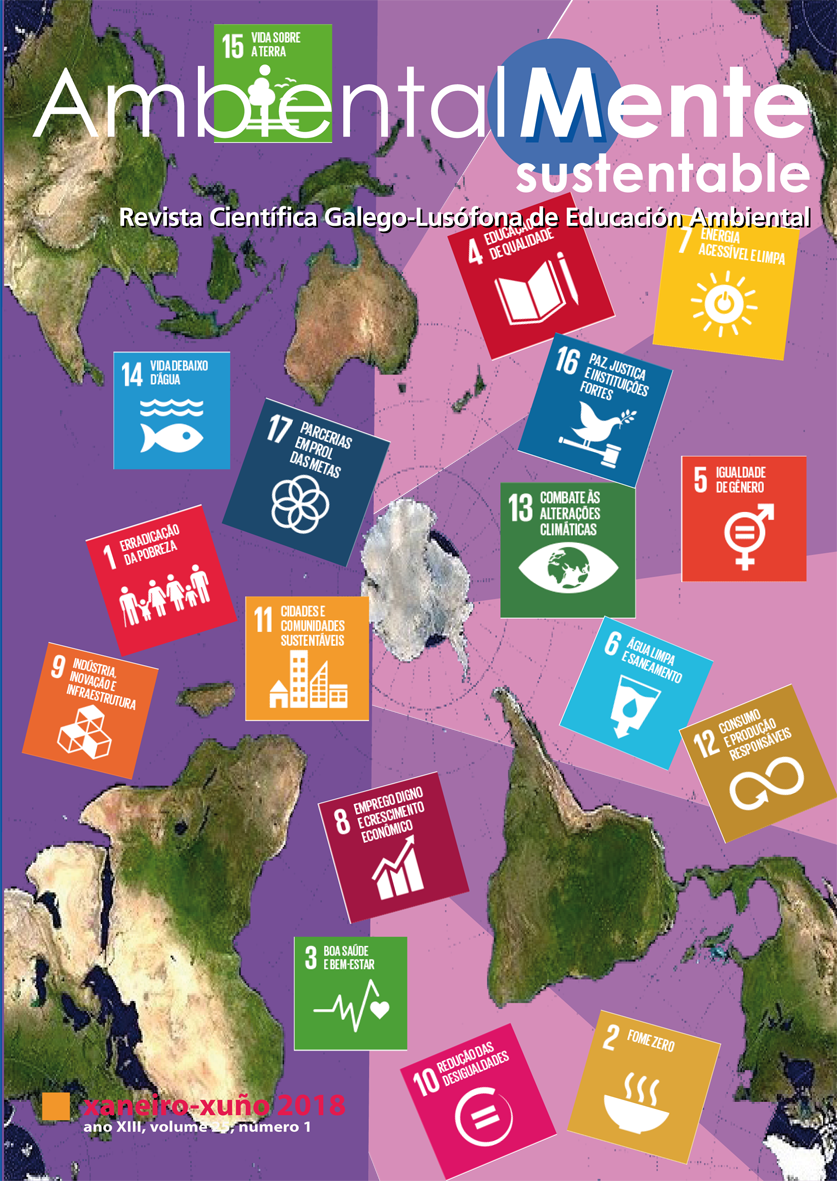A meditação na educação e a ecologia profunda
DOI:
https://doi.org/10.17979/ams.2018.25.1.4649Palavras-chave:
meditação, ecologia profunda, fenomelogíaResumo
A Modernidade dirigiu-se no privilégio às técnicas, negligenciando outras dimensões subjetivas, como os valores humanos, conceitos de felicidade, espiritualidade ou sentimentos. No labirinto da excessiva racionalidade, alguns buscam alguma saída que possibilite novas respostas à liberdade e às reflexões existenciais, que não se resumem na lógica, mas também em sentidos, crenças ou espiritualidades. A educação pode ter um destacado papel mais integrador, aliando o diálogo entre os conceitos e os afetos. O norueguês Arne Naess postulou uma ecologia profunda que não ficasse à superfície das coisas de forma fria e distante, mas que houvesse mais envolvimento humano com a natureza, com a espiritualidade e demais dimensões marginalizadas pela lógica positivista. Por meio destes princípios da ecologia profunda e um diálogo com o Zen, apresentamos e debatemos o Projeto Silêncio, que proporciona um conjunto de práticas meditativas na escola e na universidade, culminando em um mergulho coletivo de oito horas, submergidos no silêncio como pacto do grupo. Após estas vivências, 23 entrevistas foram realizadas, que revelaram o silêncio também como forma de comunicação entre o humano e o ambiente, entre o EU e o OUTRO fenomenológico, bem como fonte de aprendizado relevante à busca de novas respostas existencias.
Downloads
Referências
Baba, Sri Prem (2015). Entrevista com Sri Prem Baba [set. 2015]. Alto Paraíso: YouTube, duração 24 min. [Disponível em: https://www.youtube.com/watch?v=DfBHb9OWI9Y. Acesso em: 29 maio. 2017].
Boff, Leonardo (1995). Ecologia : Grito da Terra, Grito dos Pobres. São Paulo: Ática.
Boff, Leonardo e Mark Hathaway (2012). O tao da Libertação: explorando a ecologia da transformação. Petrópolis, RJ: Vozes.
Brown, K; Ryan, R. M.; Creswell, J. D. (2007). Mindfulness: Theoretical foundations and evidence for its salutary effects. Psychological Inquiry, vol 18, 211-237.
Bodhi, B. (2000). A comprehensive manual of Abhidhamma. Seatle: BPS.
Coen, Monja (2016). Consciência Plena. [maio. 2016]. Passo Fundo: YouTube, duração 18 min. [Disponível em: https://www.youtube.com/watch?v=DfBHb9OWI9Y. Acesso em: 24 jun. 2016].
Davidson, Richard (2010). Empirical Explorations of Mindfulness: conceptual and methodological Conundrums. Emotion. Vol 10, n.1, p 8-11.
Davis, Daphne; Hayes, Jeffrey (2011). What are the benefits of mindfulness? A practice review of psychotherapy-related research. American Psychological Association. Vol 48, n.2, 198-208.
Carta da Terra (2000). Carta da Terra: em direção a mundo sustentável. [Disponível em: http://www.cartadaterrabrasil.com.br/prt/text.html. Acesso em: 24 fev. 2016].
Freire, Paulo (1974). Educação como Prática da liberdade. 4a edição. Rio de Janeiro: Paz e Terra.
Freire, Paulo (1978). Pedagogia do Oprimido. 6a edição. Rio de Janeiro: Paz e Terra.
Fromm, Erich (1960). Psicanálise e Zun-Budismo. En Susuki, D. T; Fromm, E.; Martino, R. Mello, L. A. Zen-Budismo e Psicanálise. São Paulo: Cultrix.
Fromm, Erich (1993). The Art of Being. London: Constable.
Goswami (2008). Criatividade Quântica: como despertar nosso potencial criativo. São Paulo: Aleph.
Holzel, B.K.; Lazar, S.W.; Gard, T.; Schuman-Oliver, Z., Vago, D.R.; Ott, U. (2011) How does mindfulness meditation work? Proposing mechanisms of action from a conceptual and neural perspective. Perspectives on Psychological Science. Vol 6, 537–591.
MEC (1992). Tratado de educação ambiental para sociedades sustentáveis e responsabilidade global. Brasília, DF: MEC. [Disponível em: http://portal.mec.gov.br/secad/arquivos/pdf/educacaoambiental/tratado.pdf]
Merleau-Ponty, M. (1971). Fenomenologia da percepção. Rio de Janeiro: Freitas Barros.
Merton, Thomas (1993). Zen a as aves de rapina. 9.ed. São Paulo: Cultrix.
Merton, Thomas (2006). Místicos e mestres zen. São Paulo: Martins Fontes.
Merton, Thomas (2007). A experiência interior. São Paulo: Martins Fontes.
Naess, Arne (2008). The Ecology of Wisdom: writing by Arne Naess. USA: Counterpointpress.
Samten, Lama Padma (2013). Introdução ao Budismo pelo prajnaparamita. [dez. 2013]. Rio Grande do Sul: Canal do YouTube Lama Padma Samten, duração 1:20 min. [Disponível em: https://www.youtube.com/watch?v=9ry_kg99LO0. Acesso em: 02 maio. 2016].
Sato, Michèle (2003). Mas o que é a educação ambiental mesmo? Participação na mesa redonda do II EEEA. Rio Claro: Rede paulista de Educação Ambiental.
Susuki, D. T. (1960) Psicanálise e Zun-Budismo. In: Susuki, D. T; Fromm, E.; Martino, R.; Mello, LA. Zen-Budismo e Psicanálise. São Paulo: Cultrix.
Downloads
Publicado
Edição
Secção
Licença
Os traballos publicados nesta revista están baixo unha licenza Creative Commons Recoñecemento-CompartirIgual 4.0 Internacional.
Permitese e anímase aos autores a difundir os artigos aceptados para a súa publicación nos sitios web persoais ou institucionais, antes e despois da súa publicación, sempre que se indique claramente que o traballo pertence a esta revista e se proporcionen os datos bibliográficos completos xunto co acceso ao documento.



